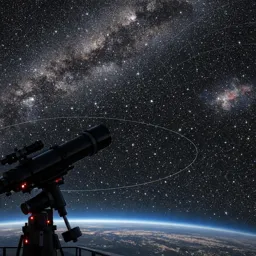Introduction
Black holes have long been shrouded in mystery and wonder, captivating the imaginations of scientists and stargazers alike. As part of our free online courses in Astronomy, we explore these enigmatic celestial phenomena that defy the boundaries of our understanding.
What Are Black Holes?
Black holes are regions in space where the gravitational pull is so intense that nothing, not even light, can escape from them. They are formed when massive stars collapse under their own gravity, compressing their mass into a very small area.
Types of Black Holes
Black holes can be categorized into three main types:
- Stellar Black Holes: Formed from the remnants of large stars that have undergone supernova explosions.
- Supermassive Black Holes: Found at the centers of most galaxies, including our own Milky Way, with masses millions to billions of times that of our Sun.
- Intermediate Black Holes: Less understood but believed to form from the collision and merging of smaller stellar black holes.
The Event Horizon: Point of No Return
The event horizon is the boundary around a black hole beyond which no information or matter can escape. It marks the black hole’s “point of no return” and is a fundamental concept in understanding these cosmic entities.
Black Hole Singularities
At the core of a black hole lies the singularity, a place where density becomes infinite, and the laws of physics as we know them break down. This is where the theories of general relativity and quantum physics intersect, challenging our understanding of the universe.
Studying Black Holes
Researchers use a variety of methods to study black holes, including:
- Observing gravitational waves generated by black hole mergers.
- Analyzing X-ray emissions from matter being pulled into a black hole.
- Utilizing advanced space telescopes like the Event Horizon Telescope, which captured the first-ever image of a black hole.
These studies continue to uncover insights into the nature of space-time, gravity, and the evolutionary history of galaxies.
The Role of Black Holes in the Universe
Black holes play a crucial role in the formation and evolution of galaxies. They influence the dynamics of star systems and contribute to the cosmic cycle of matter and energy.
Continued exploration and study of black holes will undoubtedly lead us to a deeper understanding of the universe and our place within it. Enroll in our free astronomy courses today to uncover more about these fascinating celestial phenomena and the wonders of cosmic discovery.




















